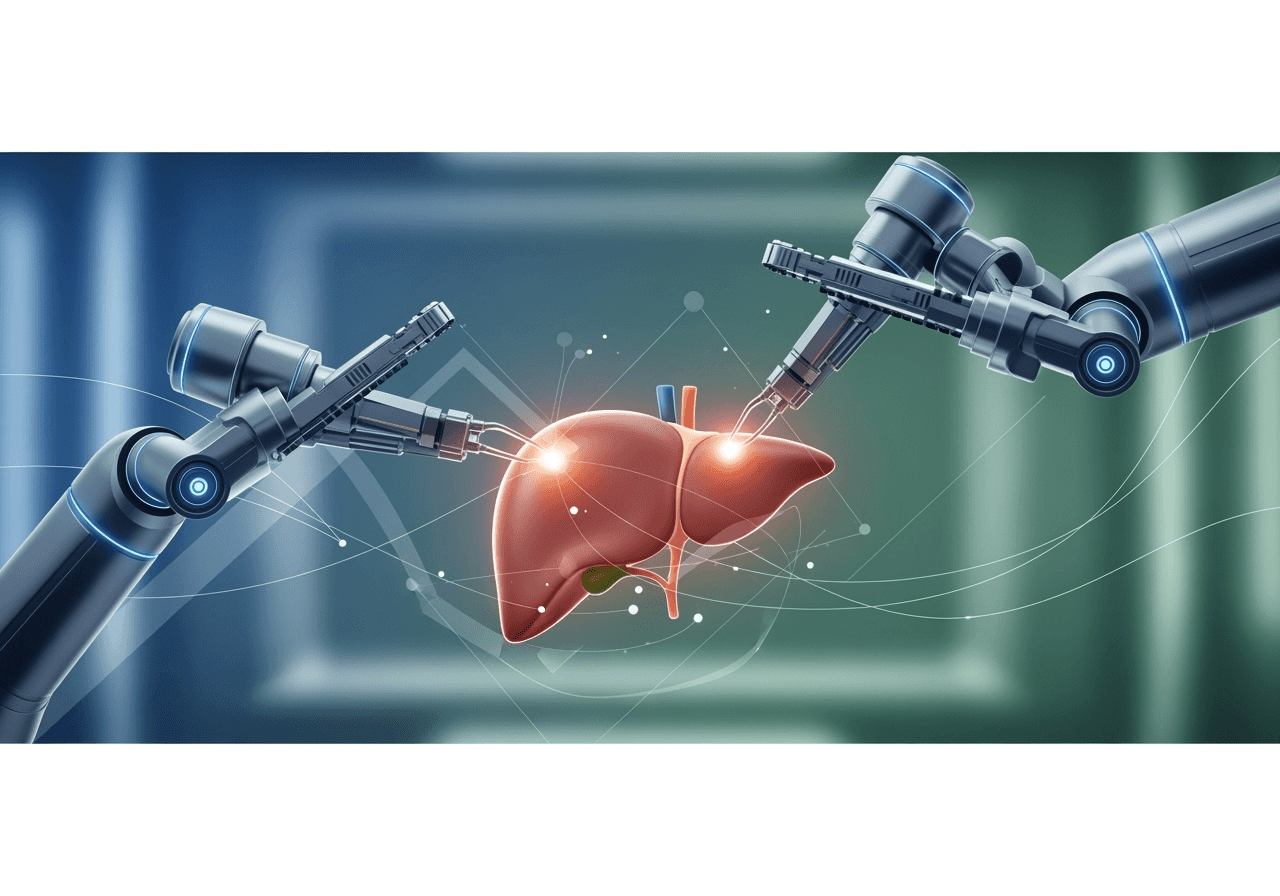
Advanced Robotic Technology Used in Liver Transplant
31 Oct, 2025
 Healthtrip
HealthtripThe Rise of Robotic Liver Transplantation
Liver transplantation is a life-saving procedure for individuals suffering from end-stage liver disease. Traditionally, this involved large incisions and significant recovery periods. However, the advent of robotic surgery has ushered in a new era of possibilities. Robotic systems, such as the da Vinci Surgical System, allow surgeons to perform complex maneuvers with greater precision and dexterity. This translates to smaller incisions, less blood loss, reduced pain, and faster recovery times for patients. Imagine undergoing a major surgery and being back on your feet sooner than you ever thought possible! Robotic liver transplantation is not just about technological advancement; it's about improving the quality of life for those in need. Healthtrip recognizes the importance of providing access to these innovative treatments and works with leading hospitals like Memorial Sisli Hospital and LIV Hospital, Istanbul, which offer state-of-the-art robotic surgery options. We aim to empower you with the knowledge and resources to make informed decisions about your health.
Most popular procedures in India
Benefits of Robotic Liver Transplantation
The advantages of robotic liver transplantation extend far beyond just smaller scars. The enhanced visualization provided by the robotic system allows surgeons to see the operating field in greater detail, leading to more accurate dissection and suturing. This is particularly crucial in liver transplantation, where intricate vascular connections need to be meticulously managed. Reduced blood loss during surgery minimizes the need for transfusions, further reducing the risk of complications. Patients also experience less pain, leading to a decreased reliance on pain medication and a quicker return to normal activities. For example, a patient who undergoes robotic liver transplantation at Vejthani Hospital in Bangkok, might experience a significantly shorter hospital stay compared to traditional open surgery. At Healthtrip, we understand that every patient's journey is unique. We connect you with hospitals and surgeons, such as those at Fortis Memorial Research Institute, Gurgaon, who can assess your specific needs and determine if robotic liver transplantation is the right option for you. We're here to support you in making the best decision for your health and well-being.
Reduced Recovery Time
One of the most significant benefits of robotic liver transplantation is the dramatically reduced recovery time. Traditional open surgery often requires a lengthy hospital stay and several weeks of recuperation. With robotic surgery, patients can often return home sooner and resume their normal activities much faster. This is because the smaller incisions result in less tissue damage and reduced post-operative pain. Imagine being able to spend more time with your loved ones and less time recovering in a hospital bed! A shorter recovery also means a faster return to work and a resumption of your daily routine. Healthtrip is dedicated to helping you find hospitals like NMC Specialty Hospital, Abu Dhabi, that prioritize patient comfort and offer comprehensive post-operative care to ensure a smooth and speedy recovery. We believe that access to advanced medical technology and personalized support can make all the difference in your health journey.
Wellness Treatments
Give yourself the time to relax
Lowest Prices Guaranteed!

Lowest Prices Guaranteed!
Improved Precision and Accuracy
Robotic systems offer surgeons unparalleled precision and accuracy during liver transplantation. The robotic arms can move with greater dexterity than the human hand, allowing for intricate maneuvers in tight spaces. The enhanced visualization provided by the robotic system further enhances the surgeon's ability to identify and preserve critical structures. This is particularly important when dealing with complex vascular anatomy in the liver. The risk of complications, such as bleeding or bile duct injury, is significantly reduced with the precision afforded by robotic surgery. Healthtrip recognizes the importance of connecting patients with experienced surgeons who are skilled in utilizing robotic technology. Hospitals such as Singapore General Hospital and Mount Elizabeth Hospital are known for their expertise in robotic surgery and commitment to providing the highest quality of care. We are here to facilitate your access to the best medical professionals and facilities, ensuring you receive the most advanced and effective treatment available.
Is Robotic Liver Transplantation Right for You?
Deciding whether robotic liver transplantation is the right option for you requires careful consideration and consultation with a qualified medical professional. Factors such as your overall health, the severity of your liver disease, and your individual anatomy will all play a role in determining the suitability of robotic surgery. It's crucial to have an open and honest conversation with a transplant surgeon who has experience in both traditional and robotic techniques. They can assess your specific situation and provide you with personalized recommendations. Healthtrip understands that navigating the complexities of medical treatment can be overwhelming. We offer a platform to connect you with leading hospitals and surgeons, such as those at Bangkok Hospital, who can provide expert guidance and support. Our goal is to empower you with the information you need to make informed decisions about your health and well-being and to ensure that you have access to the best possible care.
Where is Robotic Liver Transplant Performed?
Robotic liver transplant is a cutting-edge surgical procedure, and while it’s not yet universally available, it's offered at select, highly specialized medical centers around the globe. These centers typically possess the advanced robotic technology (like the da Vinci Surgical System), and a team of surgeons, nurses, and support staff with extensive training and experience in both liver transplantation and robotic surgery. You'll generally find these facilities in countries that are at the forefront of medical innovation. For instance, in India, hospitals like Fortis Memorial Research Institute, Gurgaon, and Max Healthcare Saket in New Delhi, are known for their advanced surgical capabilities, including robotic surgery. Similarly, in Turkey, institutions such as Memorial Sisli Hospital and LIV Hospital, Istanbul, are also leading the way. In Thailand, Bangkok Hospital stands out for its comprehensive medical services, and Vejthani Hospital also provides advanced surgical options. Within the Middle East, Saudi German Hospital Cairo in Egypt is an option that provides advanced surgical solutions. Choosing the right hospital involves considering factors like the hospital's experience with robotic liver transplants, the success rates, the expertise of the surgical team, and the availability of comprehensive pre- and post-operative care. Healthtrip can assist you in finding and comparing these hospitals, providing you with detailed information to make an informed decision about where to pursue this life-changing procedure.
Why Use Robotics for Liver Transplantation?
Why go robotic when traditional open surgery has been the standard for liver transplantation for so long? Well, imagine trying to maneuver in a tight space with limited visibility. That's the challenge surgeons face during open liver transplant surgery. Robotic surgery offers a solution to these challenges, providing surgeons with enhanced precision, dexterity, and visualization. The robotic system allows surgeons to make smaller incisions, which translates to less pain, reduced blood loss, and a quicker recovery time for the patient. Think of it like this: instead of using large, clunky tools, the surgeon gets to operate with miniature, highly precise instruments, all controlled through a sophisticated console. The 3D, high-definition view offered by the robotic system magnifies the surgical site, allowing the surgeon to see even the smallest blood vessels and delicate tissues with incredible clarity. This is particularly important during liver transplantation, where precision is paramount. Furthermore, robotic surgery can potentially reduce the risk of complications, such as infections and hernias, due to the smaller incisions. The improved ergonomics for the surgeon also translate to reduced fatigue, potentially enhancing their performance during long and complex procedures. All these factors combined make robotic liver transplantation an attractive option for both surgeons and patients, offering the potential for improved outcomes and a smoother recovery journey. Through Healthtrip, you can connect with medical experts to understand if the robotic approach is right for you, gaining access to the information you need to make a confident decision.
Who are the Ideal Candidates for Robotic Liver Transplant?
Robotic liver transplant isn't a one-size-fits-all solution. Determining who the ideal candidates are involves careful consideration of various factors. Generally, patients with end-stage liver disease who are otherwise healthy enough to undergo a major surgical procedure may be considered. However, specific criteria often include the patient's overall health, the severity and type of liver disease, and their body mass index (BMI). Patients with significant scarring from previous abdominal surgeries might not be ideal candidates, as the robotic approach relies on creating small incisions and maneuvering within the abdominal cavity. Similarly, individuals with advanced liver cancer that has spread beyond the liver may not be suitable for robotic transplantation. The decision ultimately rests on a comprehensive evaluation by a multidisciplinary team of transplant surgeons, hepatologists, and other specialists. They will assess the patient's medical history, perform thorough physical examinations, and review imaging studies to determine if robotic liver transplantation is the most appropriate treatment option. It's important to have realistic expectations and understand the potential risks and benefits of the procedure. Healthtrip can assist you in connecting with experienced transplant centers and surgeons who can provide personalized guidance and assess your suitability for robotic liver transplantation, ensuring you receive the best possible care based on your unique circumstances. Remember, finding the right match between patient and procedure is key to a successful outcome. A patient at Saudi German Hospital Cairo, Egypt, for example, would receive a tailor-made assessment to match their needs.
Also Read:
How Does Robotic Liver Transplant Work?
Robotic liver transplantation, while still a relatively new and evolving field, follows a meticulously planned and executed process. Imagine a team of highly skilled surgeons, working not directly on the patient, but guiding sophisticated robotic arms from a console. This is the essence of robotic surgery. The procedure typically starts with the same preparatory steps as a traditional open transplant, including anesthesia and careful positioning of the patient. Where it diverges is in the surgical approach. Instead of a large, open incision, robotic surgery utilizes several small incisions, usually less than an inch in length. Through these incisions, robotic arms equipped with specialized surgical instruments and a high-definition 3D camera are inserted. The surgeon, sitting at a console away from the operating table, controls the robotic arms with incredible precision. They view the operative field in magnified 3D, providing enhanced visualization, which is particularly crucial for complex procedures like liver transplantation. The robotic arms mimic the surgeon's hand movements, but with greater dexterity and range of motion, allowing for intricate maneuvers within the confined space of the abdomen. The diseased liver is carefully dissected from its surrounding structures, blood vessels are meticulously clamped and divided, and the new, healthy liver is prepared for implantation. Finally, the new liver is carefully placed in its anatomical location, and the blood vessels and bile duct are meticulously connected. The small incisions are then closed, and the patient is transferred to the recovery unit for close monitoring. The entire process demands a high degree of coordination, expertise, and advanced technological infrastructure. It's not just about robots; it's about leveraging technology to enhance the surgeon's capabilities and improve patient outcomes.
Also Read:
Advantages and Disadvantages of Robotic Liver Transplant
Robotic liver transplantation presents a compelling mix of potential benefits and inherent challenges, much like any pioneering medical advancement. On the plus side, the minimally invasive nature of robotic surgery translates to smaller incisions, reduced blood loss during the procedure, and a potentially shorter hospital stay for the patient. The high-definition, 3D visualization offered by the robotic system allows surgeons to operate with enhanced precision, particularly in areas that are difficult to access with traditional methods. This can lead to a reduction in surgical complications and improved outcomes. Patients may also experience less post-operative pain and scarring, leading to a faster recovery and a quicker return to their normal lives. However, the journey of robotic liver transplantation is not without its hurdles. The procedure can be technically demanding and requires surgeons with specialized training and experience in robotic surgery. It could lead to longer operative timings. Also, there is increased cost associated with the use of robotic equipment, which can potentially make the procedure more expensive than traditional open surgery. Not to mention, not every hospital has the advanced equipment and trained personnel to perform robotic liver transplants. It's a balancing act – weighing the potential improvements in patient outcomes against the increased costs and technical complexities. Continuous research and development and experience of medical teams will surely shape the future of robotic liver transplantation, hopefully making it more accessible and beneficial for a wider range of patients.
Also Read:
Hospitals Offering Robotic Liver Transplant
Finding a hospital with expertise in robotic liver transplantation requires some careful research. Given the advanced technology and specialized surgical skills required, this procedure is not yet widely available. However, several leading medical centers around the world are pioneering this innovative approach. In Turkey, Memorial Bahçelievler Hospital (https://www.healthtrip.com/hospital/memorial-bahcelievler-hospital) and LIV Hospital, Istanbul (https://www.healthtrip.com/hospital/liv-hospital) are known for their advanced surgical capabilities and experience with robotic procedures. In India, Fortis Memorial Research Institute, Gurgaon (https://www.healthtrip.com/hospital/fortis-memorial-research-institute) is at the forefront of robotic surgery. In Singapore, Mount Elizabeth Hospital (https://www.healthtrip.com/hospital/mount-elizabeth-hospital) and and Singapore General Hospital(https://www.healthtrip.com/hospital/singapore-general-hospital) offer advanced transplant programs that may include robotic approaches. In Thailand, Bangkok Hospital (https://www.healthtrip.com/hospital/bangkok-hospital) has invested heavily in robotic surgical technology. In Spain, Quironsalud Hospital Murcia (https://www.healthtrip.com/hospital/quironsalud-hospital-murcia) and Jiménez Díaz Foundation University Hospital (https://www.healthtrip.com/hospital/jimenez-diaz-foundation-university-hospital) are among the leading hospitals. It’s crucial to verify the specific expertise and experience of the transplant team with robotic liver transplantation at any hospital you are considering. Contacting the hospital directly and discussing your case with their transplant surgeons is always recommended.
Conclusion
Robotic liver transplantation stands as a testament to the relentless pursuit of medical innovation. It carries the promise of revolutionizing how we approach this complex surgery, offering potential benefits such as reduced invasiveness, enhanced precision, and faster recovery for patients. While the field is still evolving, with ongoing research and technological advancements shaping its future, the potential for improved outcomes and a better quality of life for liver transplant recipients is undeniable. As technology continues to advance and more surgeons gain expertise in robotic techniques, we can expect to see robotic liver transplantation become more widely accessible and refined, offering hope and improved outcomes for those in need of this life-saving procedure. For those considering liver transplantation, exploring the option of robotic surgery with a qualified medical team is a worthwhile endeavor. It is important to keep in mind that this is an evolving procedure. The medical team will offer the advantages and disadvantages of traditional versus robotic transplant, so the patient can keep his/her expectations realistic and make informed decisions.
Related Blogs

Long-Term Follow-Up After Eye Surgery
Detailed insights into eye surgery – doctors, hospitals, technology, recovery,

Healthtrip’s Transparency in Eye Surgery Pricing and Packages
Detailed insights into eye surgery – doctors, hospitals, technology, recovery,

Frequently Asked Questions About Eye Surgery
Detailed insights into eye surgery – doctors, hospitals, technology, recovery,

Advanced Robotic Technology Used in Eye Surgery
Detailed insights into eye surgery – doctors, hospitals, technology, recovery,

How Healthtrip Supports Foreign Patients for Eye Surgery in India
Detailed insights into eye surgery – doctors, hospitals, technology, recovery,

Top Medical Packages for Eye Surgery Offered by Healthtrip
Detailed insights into eye surgery – doctors, hospitals, technology, recovery,










